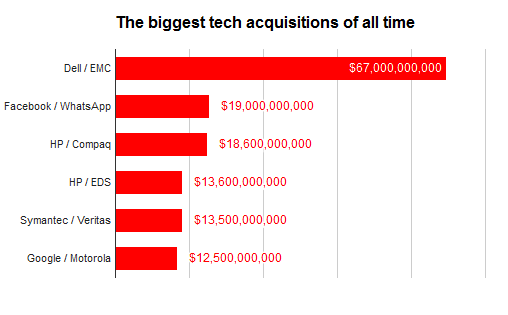Earlier today, Dell officially announced that it plans to acquire data storage giant EMC in a deal worth $67 billion. To say that the deal is big would be something of an understatement — it is the single largest tech-only acquisition of all time, and worth more than the next four acquisitions combined.
While AOL’s $106 billion purchase of Time Warner back in 2001 was a bigger deal, many would exclude that from comparison given that Time Warner wasn’t really a technology company per se at the time. So here’s the next five biggest tech-only acquisitions after Dell and EMC, though these haven’t been adjusted for inflation.
1. Facebook buys WhatsApp: $19B (2014)
In 2014, Facebook made an eye-watering $19 billion purchase of messaging giant WhatsApp, a deal that led many to predict an impending dotcom bubble burst v2.0, though WhatsApp continues to go from strength to strength, as does Facebook.
2. HP buys Compaq: $18.6B (2002)
In 2002, U.S. computing giant Hewlett-Packard shelled out $18.6 billion in a merger with Compaq. The deal was delayed after Walter Hewlett initially tried to block the deal from happening, but it was finally green-lighted by shareholders.
June 5th: The AI Audit in NYC
Join us next week in NYC to engage with top executive leaders, delving into strategies for auditing AI models to ensure fairness, optimal performance, and ethical compliance across diverse organizations. Secure your attendance for this exclusive invite-only event.
3. HP buys EDS: $13.6B (2008)
Six years after sealing the Compaq deal, HP snapped up Electronic Data Systems (EDS) in a deal worth $13.6 billion. The move ramped up HP’s credentials as a serious rival to IBM in IT services.
4. Symantec buys Veritas: $13.5B (2014)
In 2014, online security company Symantec bought utility computing company Veritas in an all-stock deal worth $13.5 billion. Two months ago, news emerged that the Carlyle Group was buying the Veritas unit from Symantec for $8 billion.
5. Google buys Motorola Mobility: $12.5B (2011)
In late 2011, Google revealed it was buying Motorola Mobility, Motorola’s mobile device arm — for $12.5 billion. It then sold the arm for less than $3 billion last year, though it retained most of the company’s key patents.


